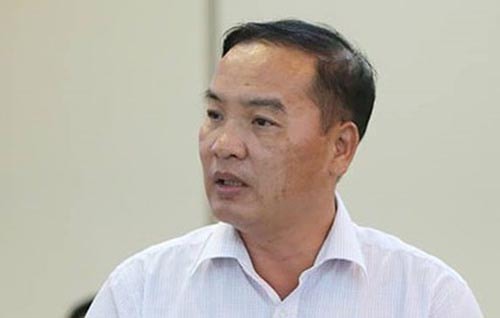Freeze accounts to prevent the dissipation of corrupt assets
Along with detecting and strictly handling corruption cases, authorities focus on applying measures to seize assets.
Anti-corruption work does not slacken
The Government's report said that in 2019, the work of preventing and combating corruption continued to be maintained and promoted, "without stopping", "without resting", "without slowing down" with a methodical, drastic, synchronous, in-depth and more effective approach; and was welcomed, agreed, supported and highly appreciated by a large number of cadres, party members and people.
Many cases have been investigated further, with more defendants prosecuted, clarifying the nature of appropriation and corruption, continuing to affirm the viewpoint of "no forbidden zones, no exceptions, regardless of who the person is".
Many major corruption cases have been discovered, prosecuted, and investigated, typically: The case of Nguyen Thanh Tai, former Permanent Vice Chairman of the Ho Chi Minh City People's Committee and his accomplices was prosecuted and investigated for the crime of "Violating regulations on management and use of State assets causing loss and waste", which occurred in Ho Chi Minh City.
|
| Former Chairman of Mobifone's Board of Members - Le Nam Tra. Photo: VTC |
The case of Vu Nhom and his accomplices for "Intentionally revealing state secrets; Taking advantage of positions and powers while performing official duties..."; the case of Le Nam Tra and his accomplices for "Violating regulations on management and use of public investment capital causing serious consequences" in the Mobifone purchase of AVG...
The investigation agency has handled 420 cases, 876 defendants for corruption crimes; of which 214 new cases, 487 defendants were prosecuted (down 18 cases, up 56 defendants compared to the same period in 2018).
People's Courts at all levels have accepted 344 cases with 849 defendants at first instance.(an increase of 31 cases compared to 2018); 240 cases were tried at first instance, with 517 defendants on corruption charges, of which 402 were serious, very serious, and especially serious crimes; 103 defendants were given suspended sentences and non-custodial reform. Nine defendants were sentenced to death or life imprisonment.
For serious and complicated cases and incidents under the supervision and direction of the Central Steering Committee on Anti-Corruption, the Ministry of Public Security assigned the Police Agency for Investigation of Crimes of Corruption, Economy, and Smuggling to investigate and verify 31 cases and 27 incidents, and the Ministry of Public Security's Security Investigation Agency accepted to investigate 1 case.
The work of detecting and handling corruption in localities has made much progress, with many complicated cases being carried out ahead of schedule and planned, gradually overcoming the situation of "hot above, cold below"; "petty corruption" has received attention and direction, creating initial changes in the awareness and actions of cadres, party members, civil servants and public employees.
“Corruption is gradually being controlled and tends to decrease although it still occurs in many areas, especially “petty corruption”, harassment, and causing trouble for people and businesses in solving work for personal gain” – the report stated.
Along with detecting and strictly handling corruption and economic cases, the authorities have focused on verifying and applying measures to seize assets and freeze accounts of corrupt criminals right from the investigation stage, preventing the dispersal and legalization of corrupt assets; encouraging criminals to voluntarily hand over corrupt assets and remedy the consequences of damage caused by their crimes to the State.
Asset recovery rate is not high
In addition to the achieved results, the report pointed out that there are still some shortcomings, limitations and difficulties, in which the rate of asset recovery during the execution phase is not high. Of the 37 cases under the supervision and direction of the Steering Committee, by the end of June 2019, civil judgment enforcement agencies at all levels had completed the execution of VND 9,454 billion/VND 68,856 billion, reaching 13.73% of the total receivable.
In some cases, there are still cases of suspects fleeing; criminal judicial assistance still faces many difficulties; the work of detecting and handling corruption at the local and grassroots levels has had many positive changes but is not uniform; there are still some localities that rarely detect and handle corruption cases; the situation of "petty corruption" still occurs in many places and has not been effectively prevented, with some cases occurring within the anti-corruption force.
Besides, the work of self-inspection and detection of corruption within agencies, organizations and units still has many limitations and weaknesses, very few cases and cases are detected through internal self-inspection.
Inspection and auditing activities have uncovered many economic violations, but the detection of corruption and transfer to investigative agencies for handling according to legal regulations is still rare, and many cases are delayed.
The number of cases discovered and handled does not accurately reflect the actual state of corruption, especially the detection and handling work at the local level. The quality and progress of investigation, prosecution and trial of a number of corruption and economic cases have not met requirements; the rate of recovery of corrupt assets has improved significantly but is still much lower than the value of assets misappropriated and causing damage.
Violations and corruption still occur in law enforcement agencies.Although there have been changes in the work of asset appraisal and valuation to handle corruption, there are still shortcomings.


